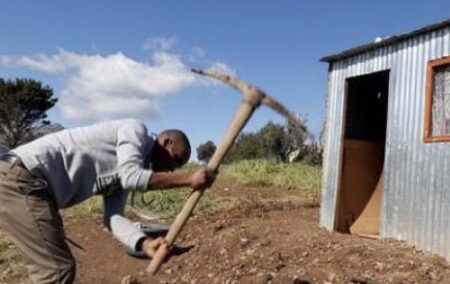All expectations are that, with the election now over, ‘the land question’ will again move swiftly to the centre of government’s agenda.
A constitutional amendment is in the offing, along with an Expropriation Bill that will enhance government’s powers to take private property. A report from the presidential advisory panel (not yet formally released, but leaked to the media) apparently envisages something similar. Expropriation without Compensation (EWC) – the empowering of the state to confiscate property – is likely to be back in the frame.
Strangely, as the election campaign rolled on, this issue was somewhat muted. True enough, it made an appearance here and there in party manifestos and radio ads, but nothing to suggest that it would be the issue on which the future of the country may turn.
Even the Economic Freedom Fighters, whose ideological brand is heavily invested in the issue, put it into a strange portmanteau message on its posters: ‘Our Land and Jobs Now’. One can’t help wondering whether the party was banking on the second item for traction…
Actually, there is little to wonder about. Land reform has not been a particularly significant issue in the election cycle. Our own polling – as the Institute of Race Relations – has found that it has lagged near the bottom of voters’ concerns, vacillating at between 3 and 5 percent of respondents.
Ipsos also put it near the bottom of its polling.
This is hardly surprising. Land reform – certainly in the sense of agrarian reform, which tends to occupy outsized public opinion and create a great deal of ideological excitement – has never been shown to be a particularly important concern for the public. Former president Thabo Mbeki recently put this into perspective when asked why his government had not responded to pressure to deal with rural land reform:
‘It’s because the ANC never identified that there was such pressure. That’s why I say we need to understand the nature of the problem. You are assuming the problem.’
He went on say that such demand as existed tended to be an urban phenomenon, one that needed to be dealt with. The demand for rural land – to practice agriculture – was a far more limited one. As such, it was a much lower priority.
Yet since 2017, land reform and then EWC have been represented as an issue of almost existential importance to the country. ‘Resolving’ them has come to mean meddling with the constitution. Indeed, pushing for land reform through EWC was something for which the ruling party has been willing to accept a considerable amount of economic damage. As Azar Jammine pointed out recently to the Financial Mail, this effectively destroyed the prospect of a Ramaphoria windfall.
At least it’s possible to say that the elections were not about EWC. EWC was about something far more fundamental – an ideologically charged move on property rights.
If this is pursued, South Africa’s people will ultimately come to understand that, election issue or not, EWC is a defining one for the country. It may indeed be the issue on which the future of the country may turn. There is no scenario in which such a policy will produce a happy outcome. A population in which around 40% of households live in poverty and 27% of the workforce is unemployed, can ill afford the economic damage that such a policy would inflict. It is a matter not of an abstract fate-of-the-nation, but of the lives and livelihoods of millions of ordinary people.
Business Leadership South Africa Chief Operating Officer Busisiwe Mavuso recently warned that government needed to reverse course on its ‘populist’ policies (EWC being, sadly, not the only one) if it hoped to stabilise the economy, and put it on a growth course. ‘The chance we have after 8 May,’ she said, ‘is not just another chance … it is the final chance.’
There would be something truly tragic if this final chance is squandered over an issue that was of such limited importance to ordinary South Africans, that even its political class failed to exploit it for cheap electoral gain. If this final chance is squandered over an issue that was of such limited importance to ordinary South Africans, that even its political class failed to exploit it for cheap electoral gain.
Terence Corrigan is Project Manager at the IRR.
Readers are invited to join the IRR by sending an SMS to 32823 (SMSes cost R1, Ts and Cs apply).

